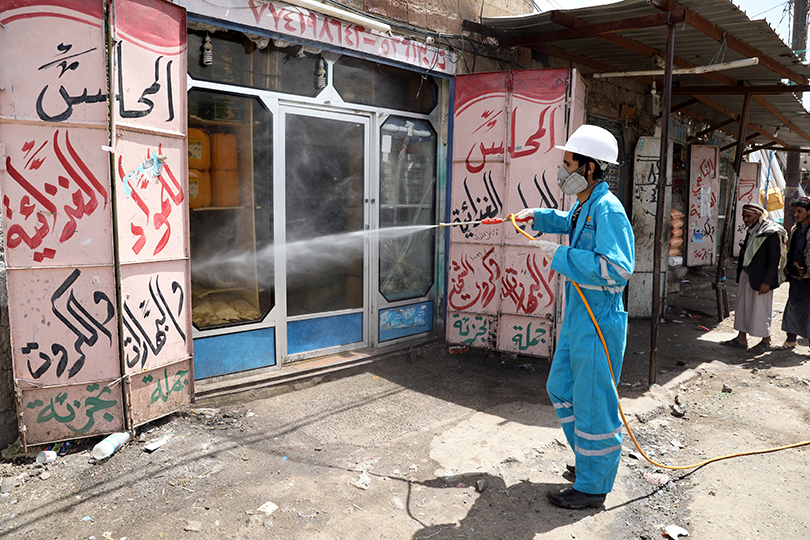The COVID-19 pandemic could not have come at a worse time for the Middle East. Since the U.S.-led international coalition secured the territorial defeat of ISIS three years ago, the region is still struggling to achieve lasting peace. Much of the region remains engulfed in ongoing conflict. The civil war has not ended in Syria, while Libya and Yemen are mired in proxy wars that have produced untold humanitarian crises.
The humanitarian cost of these ongoing conflicts cannot be understated. Hundreds of thousands have been killed and millions have been displaced. The number of those who have been forced into a life of destitution and misery is far greater. Syria’s war has displaced more than 12 million people (half its population) both internally and externally. A total of 6.5 million more have been internally displaced in Iraq and Yemen. In Libya, more than 435,000 people have been displaced. The startling statistics go on: About 11 million people need humanitarian aid in Syria; in Yemen, 24 million; in Libya, 2.4 million; and in Iraq, 4.1 million.
The Middle East faces a potential moment of reckoning, a convulsion that will have cross-border implications and destabilize countries that have managed to keep conflicts outside of their borders. In countries where state capacity has become either severely diminished or non-existent, the consequences of COVID-19 could be transformational, expanding the reach of militias, terrorists, and other armed sub-state actors who have filled governance voids to provide services to local communities, in some cases combining this with brutal subjugation.
It is in conflict-stricken countries where the impact of the pandemic will be the most acute. In Libya, Syria, and Yemen, hospitals and healthcare facilities have been directly targeted by warring factions and their external sponsors. Meanwhile, political elites, militias, and external powers engaged in proxy wars have fought fiercely over resources and territory.
Far from pushing these conflicts toward peace, the COVID-19 pandemic will most likely be a conflict-multiplier as belligerents move to intensify contestation over territories and resources, which will now include an expanded focus on securing access to vital medical supplies. The crisis is an opportunity to reinforce their reputations, double-down on the conflicts embroiling the region, and consolidate their positions in the process. In other words, COVID-19 will not prompt a rallying call for a lasting peace.
CONFLICTS AROUND THE REGION
In Libya, as Frederic Wehrey and others have pointed out, the pandemic has provided a boost to militias, providing an opportunity for them to channel medical aid to their fighters and instrumentalize the crisis to reward and reinforce patronage networks and favored communities. Troublingly, Libya’s hospitals are routinely targeted by rocket attacks, exacerbating the situation.
In Yemen, militias loyal to the UAE-backed Southern Transitional Council (STC) stormed into the southern port of Aden and stole medical aid donated by the World Health Organization (WHO), including nine ambulances destined for the health ministry. The conflict in Yemen has involved indiscriminate attacks that have devastated medical facilities and water supplies, contributing to what the international community has described as the world’s greatest man-made humanitarian crisis, including the worst cholera outbreak in modern history. In Lebanon, Hezbollah has reinforced its status as an alternative to the Lebanese state by committing close to 5,000 doctors, medics, and nurses to fight the pandemic.
In Iraq, ISIS has ramped up its attacks in northern Iraqi villages and is moving to exploit Baghdad’s growing list of crises — ranging from the escalation between the U.S. and Iran, the decline in oil prices, and country-wide protests. During a public health crisis, ISIS can revive itself and expand its influence by catering to the needs of local communities in ways other authorities — like the Baghdad government — have not. At a minimum, Baghdad’s failures allow ISIS to position itself as a viable alternative. Combined with its current campaign of fear and intimidation, targeted assassinations, and extortion, this provides it with a patchwork, under-ground infrastructure of influence that establishes a launching pad from which to seize towns and cities in the manner it did in June 2014.
In Syria, the civil war has shattered formal governing structures, and the Assad regime and Russia have moved to obliterate hospitals from the outset of the nine-year conflict. Syria is effectively three countries: regime-controlled territories, the Kurdish northeast, and Idlib in the northwest, which has 1.4 doctors per 10,000 people and only 100 ventilators. COVID-19 increases the prospects of another refugee wave that stretches the capacity of neighboring countries like Turkey and Lebanon to meet the humanitarian needs of these refugees. It also puts increased pressure on Western-aligned groups like the Kurdish-dominated Syrian Defense Forces (SDF), on which the West depends to maintain combat operations against ISIS and manage prison cells for detained ISIS combatants. The SDF also hosts refugee camps like Al-Hor, which houses 70,000 refugees, including ISIS combatants and their families.
The humanitarian devastation in Syria will worsen if these enclaves do not adopt a collective response to the pandemic. Actors on the ground must refrain from targeting supply lines and enable the space for outside assistance. Pro-Turkish forces have cut off water supplies to Kurdish-held areas in the northeast, which compromises the ability of humanitarian agencies to protect vulnerable communities during the pandemic. Meanwhile, the Assad regime has refused to extend the support it receives from the WHO to non-regime-held areas. That, by default, becomes an indictment of the WHO, which refuses to operate beyond regime-held Damascus. Such institutions are paralyzed and ill-suited to conflict zones by design because of international norms that confine them to work around the contours of sovereignty, even though the Assad regime should arguably no longer enjoy the benefits conferred by state sovereignty given its egregious behavior.







Comments